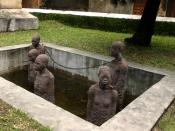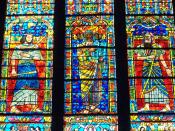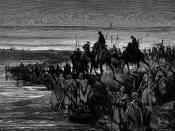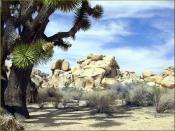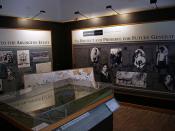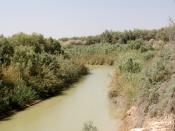Personal expression through poems, songs, or oracles all through time has been a means to personify ones culture or ethnic foundation. One could agree that these individual expressions are important in translating civilized life from one generation to the next. An example of this philosophy can be found in Charlie Reilly's historical collection "Ballads and Ballasts."ÃÂ The spirituals were not just simple Christian songs vocalized by slaves after white religious sermons. They were well-orchestrated hymns directly related to the profound melancholy and the impassioned desire for freedom felt by the Negroes, as a direct result of being in bondage. The spirituals held a clandestine code wailing for freedom that, at the time, only the Negro slaves could interpret. One can clearly see the brilliance of how polyrhythmic spirituals represent the objection to slavery, through biblical figures and locations such as Moses, Jordan River, and Joshua.
Rielly's insightful use of the spiritual "Go Down, Moses"ÃÂ present itself through Moses' outcry of the slaves for liberation.
In biblical history Moses heed warning to the Pharaoh to let his people go. He cautioned that if the Israelites were not freed, horrendous consequences to the extent of death to Egyptian children should be foreseen. In the spiritual Moses is depicted to portray the same message about American slavery. The spiritual uses the Pharaoh as a metaphor for the slave owners and Moses being the voice of the slaves. Moses foreshadows if freedom is not bestowed once again hardship awaits the slave owners in the future.
Rielly's further wisdom on freedom is brilliantly illustrated in the heavenly spiritual " Deep River"ÃÂ which demonstrates the aching desire to return home. In biblical time the Jordan River was the great divider which was what isolated the Israelites from the promise land. The spiritual uses the Jordan River as a parable for the Atlantic Ocean which separates the Negro slaves from there the promise land. The spiritual provides a hint about the chronicles of slavery, and how bodies of water have seperated many slaves from their home land. It depicts the campground being their resting-place where they hope to return to some day.
Rielley best exemplifies the ingenious concealed meanings of the spirituals in "Joshua Fit the Battle of Jericho"ÃÂ which describes how a gallant leader shall rise up and lead the slaves back to the promise land. During biblical times Joshua was a leader and a liberator that led the Israelites across the Jordan River and won the battle for Jericho, the promise land, from the Caananites. This moralizing story characterizes a leader and liberator like Joshua among the bound who shall return the Negro slaves back to the Motherland. This liberator shall conquer the Caananites, or the slave master. Finally, this leader would be a genuine token of freedom and bring the eminence of liberty back to the African race.
